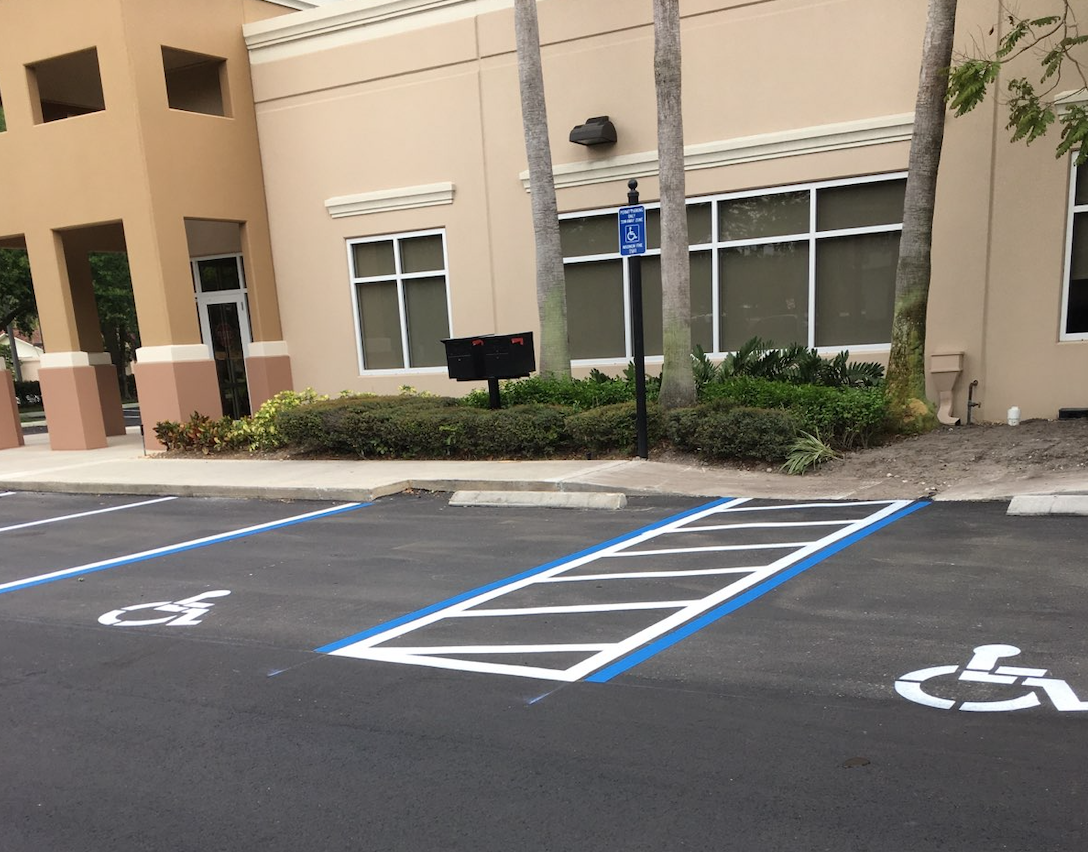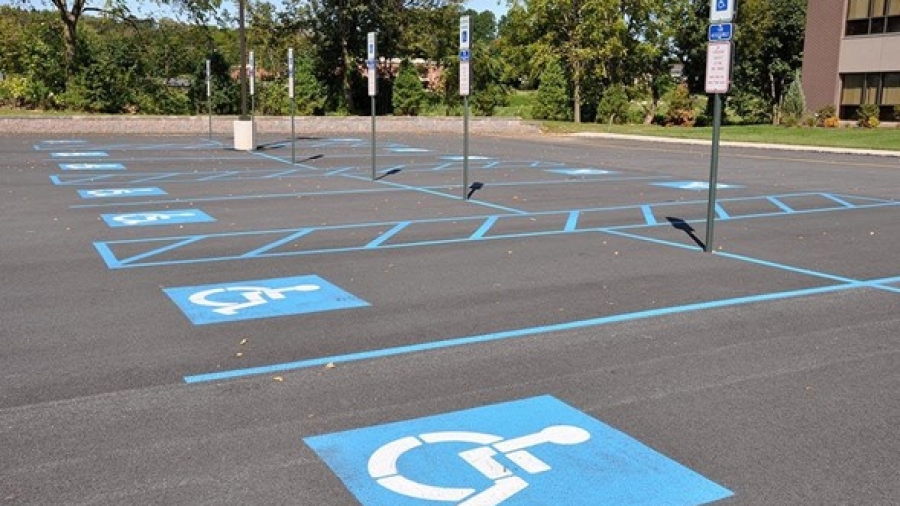Since March 15, 2012 there have been changes in the regulations on every facility’s accessibility to the parking lot, in order to facilitate people with disabilities to enter these establishments without any inconvenience or risk of having an accident.
If the structure was built before the referenced date without any of those regulations, there must be arrangements to adapt the property and make it compliant. If the property is not compliant, there could be legal consequences such as fines and lawsuits.
Likewise, to differentiate these types of parking spaces from conventional parking lot spaces, they must be marked with the international symbol of accessibility. This signage consists of a man with a wheelchair in a deep blue background.
 All of these sign postings must be placed at a height of 5 feet (60 inches) from the surface of the parking lot so the sign is visible to everyone.
All of these sign postings must be placed at a height of 5 feet (60 inches) from the surface of the parking lot so the sign is visible to everyone.
These handicapped parking spaces should not have any curbs or stairs, they must have an ADA handicap ramp with dimensions of 3 feet wide and its slope should not be greater than 1:12 in orientation of the path. Furthermore, the surface must be firm, stable and non-slippery in order to avoid accidents. Handicap parking spaces can be recognized because they do not have solid white lines, they usually have blue straight lines.
The previous specifications are established by the American with Disabilities Act (ADA), for each disabled person to have guaranteed easy and direct access to the facility. These specifications and regulations are nationwide and every state must apply them. ADA is extremely important because it provides standards for accessible design to different types of properties.
If facilities do not comply with those requirements, the property manager or the person in charge of the property can be sanctioned by law and the cost of the fines could be very high. Thus, following these guidelines not only avoid sanctions, but also make facilities more accessible to everyone in the community.
Handicapped parking Spaces Proportion
Depending on the number of standard parking spaces a parking lot has, by law, there must be a certain number of handicapped spaces so everyone can have access to that facility. Moreover, the parking lot must have handicapped van parking spaces. This relation between regular parking lots and handicapped parking spaces (Standard + Van) are:
Total Parking Spaces | Standard Accesible | Van Accessible Space | Total (Standard + Van) |
1-25 | 0 | 1 | 1 |
26-50 | 1 | 1 | 2 |
51-75 | 2 | 1 | 3 |
76-100 | 3 | 1 | 4 |
101-150 | 4 | 1 | 5 |
151-200 | 5 | 1 | 6 |
201-300 | 5 | 2 | 7 |
301-400 | 6 | 2 | 8 |
401-500 | 7 | 2 | 9 |
500 to 1000 | 5 out of every 6 Accessible Parking Spaces | 1 out of every 6 Accessible Parking Spaces | 2% of total parking provided |
1001 and over | 5 out of every 6 Accessible Parking Spaces | 1 out of every 6 Accessible Parking Spaces | 20 plus 1 for each 100 over 1000 |
Medical Facilities
Medical entities need more handicapped parking spaces in order to guarantee free spaces for ambulances, and for disabled people that might have an emergency and need urgent access to the facility.
Therefore, in hospitals it is required that around 10% of the standard parking lot tas to be adapted for handicapped spaces. Similarly, those facilities that are specialized in the treatment of mobility-related conditions such as rehab and physiotherapy centers the ADA Handicap Parking Requirements establish 20% of accessible parking lots.
Exceptions
Some facilities have the freedom to implement these special types of parking space because of the business nature or type of operation. Some of those parking facilities that are exempted from those specifications are related to:
- Buses.
- Trucks.
- Delivery vehicles.
- Law enforcement vehicles.
- Vehicular impound.
However, it is important to mention that if those places are frequently visited by pedestrians who have disabilities, the parking lot must be adapted with a loading area in order to facilitate their transit.
The conditions of the parking lot space, their access corridor, paths, routes and signages must be excellent. If cracks, potholes, trip hazards or any other issue starts to show up on the surface, it must be fixed immediately as this type of irregularity can cause an accident or may impede pedestrian transit.
It is vital to keep the way clean; to remove garbage, rocks or any other element that can be considered as an obstacle in order to avoid any inconvenience with the pedestrians that frequent these areas.
Finally, it is important to take care of pavement markings on the parking lot, since they start to fade over time. In order to avoid this problem, we recommend doing the pavement markings with a thermoplastic striping service, which is cheaper and has better performance than regular parking lot striping.

